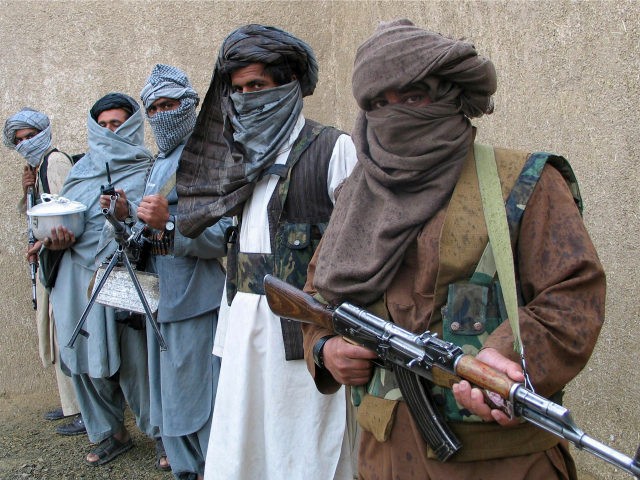“Unidentified gunmen” killed a prominent Afghan journalist on Thursday following a declaration by the Taliban that it would soon begin targeting members of the media with which it has disagreements.
The Taliban claimed not to be involved in the death of former Tolo News anchor Nemat Rawan, who at the time of his death was working for Afghanistan’s Ministry of Finance. Rawan had previously worked for Tolo News’ Pashto language service and hosted a political debate show called Tawde Khabare (“Hot Topics”). The Taliban does not consider the government of Afghanistan legitimate, but rather a group “usurping” its own power. Rawan’s role as a government official may have made him a target.
Taliban spokesmen have openly embraced an increase in violence following the decision by President Joe Biden to extend America’s military presence in the country beyond May 1, when his predecessor Donald Trump had agreed to accept as a deadline for ending the American role in the 20-year Afghan war. The Trump administration cut a deal with the Taliban last year that required the latter to not attack U.S. troops and to cut ties with international jihadist organizations in exchange for a full American military withdrawal from the country by May 1, 2021.
Biden announced shortly before the deadline that he would withdraw all American troops by September 11, 2021 – the 20th anniversary of the al-Qaeda jihadist attacks in New York and Washington, DC – and that the decision to extend the war was a product of his conclusion that the war had gone on too long. Biden’s extended withdrawal has reportedly required a surge in troops on the ground.
Since then, Taliban jihadists have escalated attacks nationwide, particularly against Afghan security forces but also involving civilians.
Authorities have not been able to identify any potential suspects behind the killing of Nemat Rawan, his former employer Tolo News stated on Friday. Citing Kandahar security officials Ghorzang Afridi, Tolo stated that Rawan was killed in his car by at least two suspects. The killing occurred in Kandahar. Rawan leaves behind a wife and three-year-old child.
“The first one of the attackers stopped his car and the second one came on a motorbike and shot him,” Afridi explained. “The attackers have also stolen his phone.”
Afghan President Ashraf Ghani issued a statement Friday blaming the Taliban directly for Rawan’s killing.
“The group of Taliban must realize that the continuation of the war and violence against the people is not an Islamic, humane and reasonable solution, but could further complicate the situation and waste the opportunity for peace,” he asserted.
A Taliban spokesman insisted, however, that the group had not targeted Rawan or executed him.
“The assassination of Nemat Rawan … is not linked to the Islamic Emirate,” spokesman Qari Yousuf Ahmadi said in a message on Twitter, according to the Agence France-Presse (AFP). Rawan had not recently attracted any known threats from the Taliban and was not working as a journalist at the time of his death. Previously, he had been the host of Tolo News’
That statement arrived closely after another Taliban spokesman, Zabullah Mujahid, issued a warning on Wednesday that the jihadist group would soon refocus its energy on killing journalists, leading many observers to disregard the Taliban’s denials. Mujahid maintains an official Twitter account where he speaks on behalf of the terrorist organization, which refers to itself as the “Islamic Emirate of Afghanistan.”
۲/۱ــ یادونه!
له څو ورځو راهیسې موږ د ځينو #رسنیو د پروپاګند او یو لوریزو نشراتو شاهدان یو.
د دغو نشراتو تر شا د #کابل ادارې د استخباراتو لاس دی.
رسنۍ او #خبریالان باید هوښیارې و اوسي، خپله بې طرفي حفظ کړي او د هیواد په دې حساسو شرائطو کې د کابل ادارې د پروپاګند وسیله ونه ګرځي.— Zabihullah (..ذبـــــیح الله م ) (@Zabehulah_M33) May 5, 2021
“In the case that journalists and media outlets public fake news or misinformation, the impartiality of the media and journalists will be seriously questioned,” Mujahid said in a series of posts to Twitter on Wednesday. “If this continues, the responsibility for what follows will fall on the media officials themselves and their staff.”
“For several days now, we have been witnessing one-sided propaganda and publications in some media. The Kabul administration is directly behind this type of intelligence (national security) publication,” Mujahid continued. “The media must stay aware, maintain their neutrality, and not be transformed by the propaganda of the Kabul administration.”
Afghanistan’s Khaama Press noted that day that, given how vague Mujahid’s warnings were, “media outlets are left in the confusion of what type of news they should publish and broadcast to the Afghan public.”
The outlet noted that journalists and media workers generally have faced mounting acts of violence against them in the country in the past six months. In one of the most shocking recent incidents, in March, unidentified attackers killed three women who worked as translated voiceover actors for scripted dramas. The Taliban also distanced itself from that attack; the Islamic State, a Taliban rival, claimed responsibility.
Khaama Press reported on Wednesday that at least 20 journalists and other media workers have been killed in the past six months “and dozens have received death threats for their work.” At least 11 killings of Afghan journalists occurred in all of 2020, suggesting a shift in emphasis on attacks against them in recent months.
Follow Frances Martel on Facebook and Twitter.

COMMENTS
Please let us know if you're having issues with commenting.